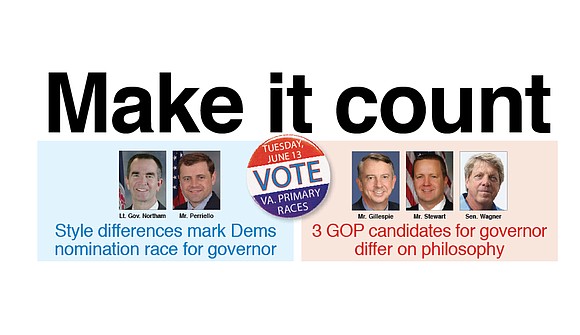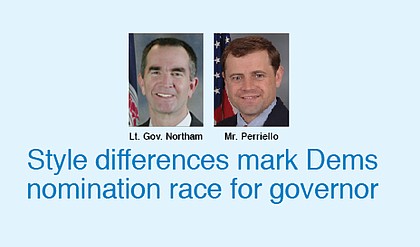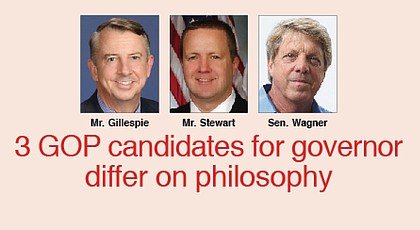Make it count
6/9/2017, 11:05 a.m.
Style differences mark Dems nomination race for governor
By Jeremy M. Lazarus
It looks like 2016 all over again in the Democratic primary as voters prepare to decide whether Lt. Gov. Ralph S. Northam or former Congressman Tom S. Perriello will carry the party’s banner into the November race for governor.
Last year, Hillary Clinton, with the backing of the Democratic establishment, battled Bernie Sanders, the darling of the party’s left wing, for the presidential nomination.
This time, Virginia’s Democratic Party establishment is backing Lt. Gov. Northam, 57, while the Sanders camp is pushing Mr. Perriello, 42, who projects the charisma and appeal that his rival appears to lack.
The Clinton-Sanders contest exposed the fault line between the populist wing and the centrist wing of the Democratic Party.
That same fault line is evident in the tight race between Lt. Gov. Northam, a pediatric neurosurgeon, and the former one-term congressman who was the only member of the U.S. House of Representatives that President Obama campaigned for in 2010.
Mr. Perriello lost his seat for backing the Affordable Care Act. He was swept out of office on a Republican backlash to the former president’s major health care reform bill.
Where African-American voters stand is unclear. Virtually the entire membership of the Virginia Legislative Black Caucus is backing Lt. Gov. Northam, for example, but whether such endorsements will translate into votes by the rank and file remains to be seen.
On the issues — from health care to education to prison reform — Lt. Gov. Northam and Mr. Perriello appear to have few differences. Indeed, the main difference appears to be style.
Lt. Gov. Northam has a more limited voice that makes it more difficult for him to command a big crowd, which is where Mr. Perriello shines.
Those who know Lt. Gov. Northam like him and the stands he has taken for gun control, for limiting smoking in public places and for supporting gay marriage. But they also wish he was more like the extroverted Democratic Gov. Terry McAuliffe.
Mr. Perriello heard those mutterings of discontent and entered the race on Jan. 11, disrupting what looked like a free run to the nomination for Lt. Gov. Northam.
Party regulars had hoped that Lt. Gov. Northam would be able to spend the spring shoring up Democratic support and raising the money needed to take on the likely Republican candidate, Edward W. “Ed” Gillespie, the former Republican National Committee chairman.
Both Lt. Gov. Northam and Mr. Perriello have sought to tap into the anger that Democrats feel about the 2016 election victory of President Trump and the many policy changes he is seeking to overturn longstanding health and environmental polices.
Lt. Gov. Northam calls the president a “narcissistic maniac” in one television ad, while Mr. Perriello is shown in his ad standing in front of an ambulance getting crushed by a compactor, which he called a metaphor for what the president and Republicans are seeking to do to health care.
Still, Mr. Perriello remains the underdog, with a smaller campaign war chest. And there is little evidence that he has begun peeling away supporters of Lt. Gov. Northam.
If regular Democrats turn out for next Tuesday’s primary, and college students and others who backed Sen. Sanders fail to show up to the polls in big numbers, Mr. Perriello will return to the sideline, observers suggest.
If Lt. Gov. Northam wins, he may owe Mr. Perriello for helping to get him ready for the fall campaign. In the past few weeks, Lt. Gov. Northam has increasingly been seen as becoming more dynamic and more tuned in to social media.
The real test of his support and the support for Mr. Perriello will come next Tuesday, when the voters make their choice known at the ballot box.
By Warren Fiske
All signs point to an easy win for Edward W. “Ed” Gillespie, a deeply connected GOP strategist, in the June 13 Republican primary for governor.
Mr. Gillespie, 55-year-old public affairs consultant and former chairman of the Republican National Committee, holds wide leads in polls and fundraising over his two adversaries for the GOP gubernatorial nomination — Corey A. Stewart, chairman of the Prince William County Board of Supervisors, and state Sen. Frank W. Wagner of Virginia Beach.
Mr. Gillespie introduced himself to Virginia voters in 2014 when he ran for the U.S. Senate and nearly upset incumbent Democrat Sen. Mark R. Warner. Mr. Gillespie has run a classic Main Street campaign this year, promising to lower taxes and shrink state government, corralling endorsements from the GOP’s establishment and trying to stay above the fray of his opponents.
But Virginia primaries are quirky contests during non-presidential election years because they draw little interest and, often, only about 5 percent of registered voters cast ballots. That gives hope to Mr. Stewart and Sen. Wagner, who may need to create only ripples of support — not waves — to win.
Mr. Stewart, a 48-year-old international trade attorney, made his name in Virginia politics leading efforts in Prince William County to crack down on undocumented immigrants, whom he blamed for much of the county’s violent crime. This year, he is offering himself as the defender of Confederate heritage and the champion for supporters of President Trump.
Mr. Stewart has made headlines criticizing a recent decision by the Charlottesville City Council to take down a statue of Confederate Gen. Robert E. Lee. He has vowed, if elected governor, to preserve the statue, the Confederate Flag and other public relics of the Confederacy.
“Nothing is worse than a Yankee telling a Southerner that his monuments don’t matter,” the Minnesota native posted on Twitter on April 24.
Calling Mr. Gillespie “Establishment Ed,” Mr. Stewart has criticized the GOP frontrunner for keeping his distance from President Trump during last year’s presidential election. Mr. Gillespie did not appear with the presidential candidate at rallies and only tepidly endorsed him.
Mr. Stewart was chairman of the Trump campaign in Virginia until early last October when he was fired for making unauthorized statements criticizing the Republican National Committee as “establishment pukes” for not amply supporting President Trump.
Mr. Stewart is promising to outlaw sanctuary cities and counties in Virginia — a term used to describe jurisdictions that, in one way or another, don’t cooperate with federal immigration authorities.
While Mr. Stewart has poked at emotional issues, Sen. Wagner, a 25-year veteran of the General Assembly, has tried to brand himself as the only Republican candidate with the experience and grasp of state issues necessary for a governor.
Sen. Wagner, a 61-year-old businessman who has started and sold two boat repair companies, has scorned Mr. Gillespie’s plan to cut taxes, calling it a “lazy political stunt” by someone who “doesn’t have a clue” about Virginia’s finances.
Mr. Gillespie is calling for a 10 percent cut in the state income tax. His plan, when phased in over three years, would cost the state about $1.3 billion annually.
Mr. Gillespie says his plan would spur economic growth and Virginia can easily absorb its cost, partially by eliminating unidentified waste and paring 1,000 jobs from the state government’s 105,000-member workforce.
Sen. Wagner says Virginia needs to make some wise, long-term investments instead of cutting taxes. He notes that the state has made heavy withdrawals from its reserve fund, has $17 billion in pension liabilities and faces uncertainty over the amounts of future federal funding its will receive.
Although Virginia still has a top-notch AAA bond rating, Standard & Poor’s, a major credit rater, recently downgraded its outlook on the state’s economy from “stable” to “negative.”
Sen. Wagner also said the state needs to invest in transportation and is calling for a sliding gas tax that will rise when gas prices drop, and fall when gas prices rise.
While Sen. Wagner contends that Mr. Gillespie’s tax cut is irresponsible, Mr. Stewart criticizes the proposal for not going far enough. He is calling for the elimination of all personal state income taxes.
The Washington Post conducted a mid-May poll of 250 likely voters in the Republican primary. Thirty-eight percent favored Mr. Gillespie, 18 percent were for Mr. Stewart and 15 percent backed Sen. Wagner. The poll’s margin of error was 7 percentage points.
The latest campaign finance reports on June 1 show that Mr. Gillespie has raised $4.9 million and has $2.5 million left in his war chest; Mr. Stewart has raised almost $1 million, of which $187,000 is unspent; and Sen. Wagner has raised $644,000 and spent all but $59,000.









